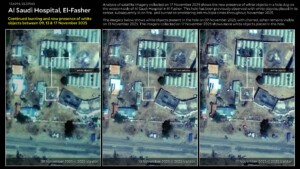Corruption in Sudan’s telecoms sector exposed in new report
The Sudan Democracy First Group has sharply criticised the “deliberate secrecy, lack of transparency, and steady increase in taxes” in a report on corruption in the telecommunications sector in Sudan.
The Sudan Democracy First Group has sharply criticised the “deliberate secrecy, lack of transparency, and steady increase in taxes” in a report on corruption in the telecommunications sector in Sudan.
In an interview with Radio Dabanga on Monday, Ammar Gasem Hamouda, the author of the report entitled Beyond Coverage, Corruption and Lack of Transparency in the Telecommunications Sector in Sudan which was prepared by a group of experts, cited the increase in VAT from 10% in 1999 to 30% in 2012 and pointed out that there is a proposal to raise it to 35%.
The report pointed to the widespread political and security interference in the telecommunications sector, despite the fact that its decisions are given a veneer of legality.
It asserts that “companies operating in the telecommunications sector protect themselves with the presence of influential figures from the President's family in their boards.” and accused the authorities of “manipulating public funds, violating citizens' freedoms, and spying on them”.
Hamouda said the government views the telecommunications sector as the main resource for the state treasury by imposing indirect taxes on the citizens.
The report pointed to “strong corruption networks organically interconnected with each other”.
Hamouda says the report directs a message to foreign investors to recognise the rights of citizens and what the situation could lead to in the event of political change.
Workers’ rights
The report accused telecommunications companies of absenting the voice of workers and their rights to form free workers’ unions and committing abuses of their rights.
It considered the adoption of the revenues instead of profits tax in the telecommunications sector as a recognition of manipulation of financial reports for tax evasion.
The report accused the government of “transferring public property to government followers at the lowest prices”.
In his recommendations, Hamouda, told Radio Dabanga that the fight against corruption in the telecommunications sector comes only through political change and the democratic alternative.
Fight against corruption
He pointed out that the report called for wise management of the telecommunications sector and called on the National Telecommunications Corporation to stand on the side of citizens to ensure that they get better service.
He also called on the Corporation that companies be required to share the infrastructure of the telecommunications sector in order to reduce costs that increase the cost of calls.
He called on the Corporation to protect citizens from fraudulent crimes by raising awareness about security risks.
‘Calls monitored’
MP Kamal Omar of the leadership of the Popular Congress Party, accused ‘known entities’ of monitoring the calls of politicians.
Omar called on the Sudanese people to sue the National Telecommunications Corporation for linking their data sim card with the national number which he considered as “infringing on the freedom of people, restrictions, and the Constitution without legal basis”.
He pointed that the constitution guarantees people’s freedom of communication and protects their privacy.











 and then
and then